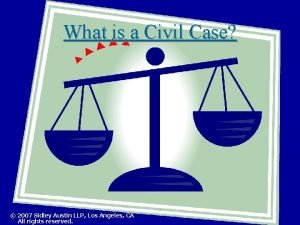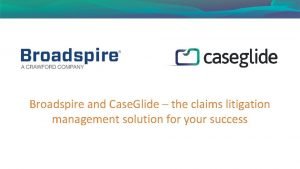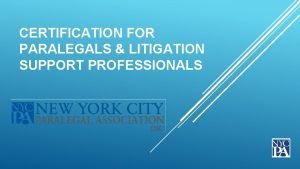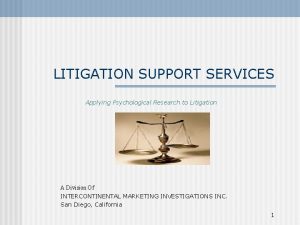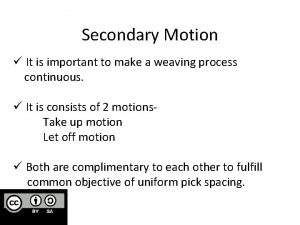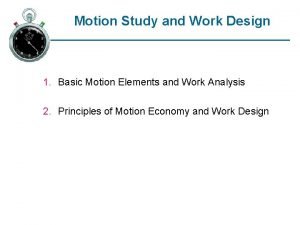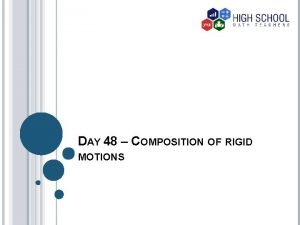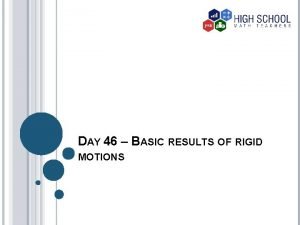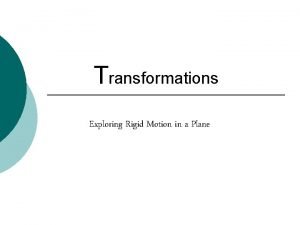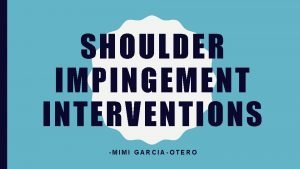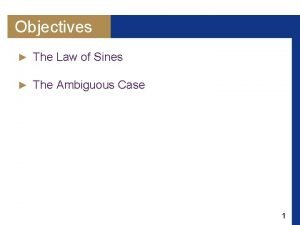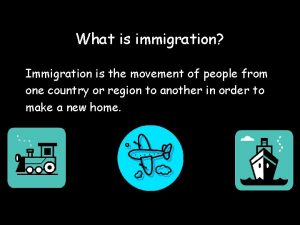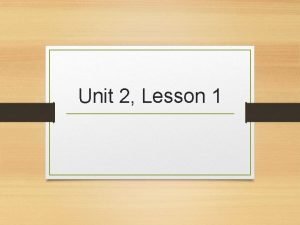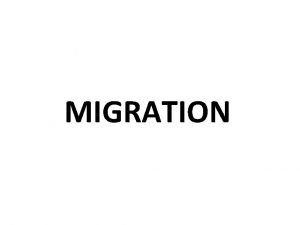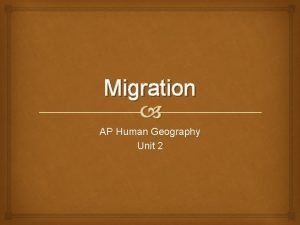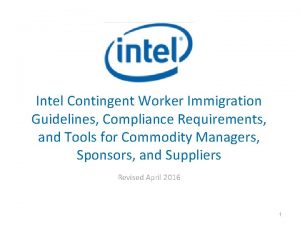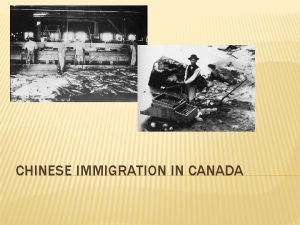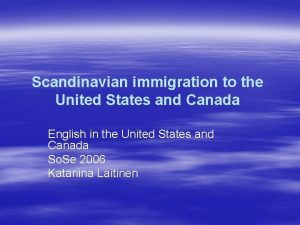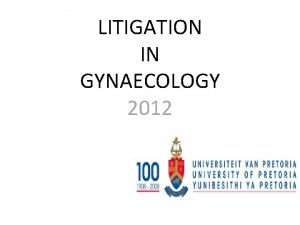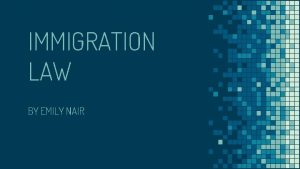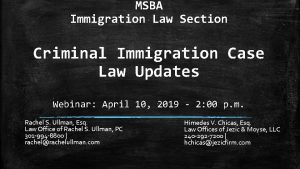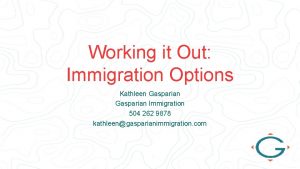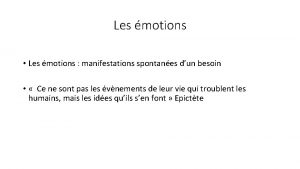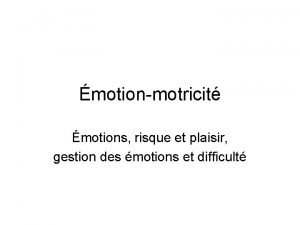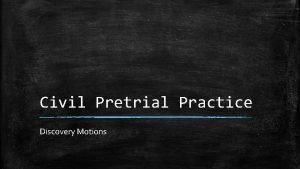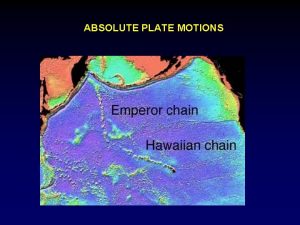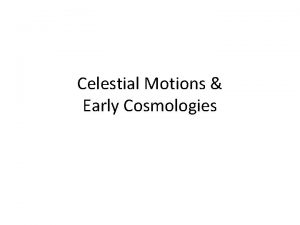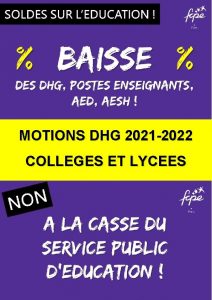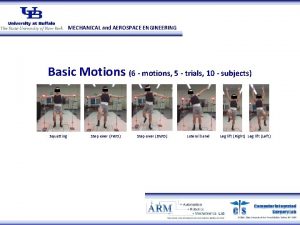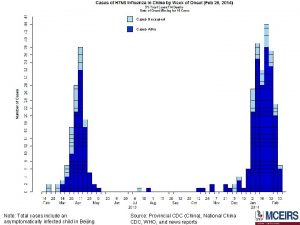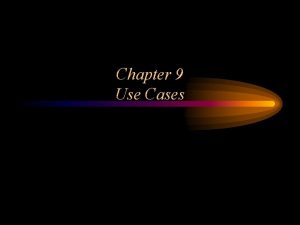Hamama Litigation Cases Immigration Law Options MOTIONS TO







































- Slides: 39

Hamama Litigation Cases: Immigration Law Options

MOTIONS TO REOPEN

Types of Immigration Judge Removal Orders • Stipulated orders of removal • Respondent present at hearing and denied relief or respondent requested a removal order • Respondent failed to depart after being granted Voluntary Departure • Respondent failed to appear for a hearing and received an in absentia order

Why did the IJ deny relief? • Some respondents are ordered removed having never presented any claim for relief because of the following sample reasons: – Pro se and could not navigate process, including presenting relief application – IJ denied continuance to find counsel to present relief application – Ineffective assistance of counsel – Did not want to remain detained – No relief available at the time of the hearing

General Requirements of Motions to Reopen • Generally, Motions to Reopen must: – Be filed within 90 days of the IJ or BIA’s order OR meet the requirements for an exception. INA § 240(c)(7)(C)(i); 8 C. F. R. §§ 1003. 2(c)(2), 1003. 23(b)(1). – Be limited to one Motion to Reopen is allowed (subject to same exceptions above). – Be accompanied by fee receipt, motion for fee waiver, or explanation regarding why motion is fee exempt. – Present evidence that was previously unavailable and material during the proceedings before the Immigration Judge. – Be filed according to the “last adjudicator rule. ”

Motion to Reopen: Statutory Exceptions INA § 240(c)(7)(C)(i): Except as provided in this subparagraph, the motion to reopen shall be filed within 90 days of the date of entry of a final administrative order of removal. • (ii) Asylum. -There is no time limit on the filing of a motion to reopen if the basis of the motion is to apply for relief under sections 208 or 241(b)(3) and is based on changed country conditions arising in the country of nationality or the country to which removal has been ordered, if such evidence is material and was not available and would not have been discovered or presented at the previous proceeding. • (iii) Failure to appear. -The filing of a motion to reopen an order entered pursuant to subsection (b)(5) is subject to the deadline specified in subparagraph (C) of such subsection. • (iv) SPECIAL RULE FOR BATTERED, SPOUSES, CHILDREN, AND PARENTS - Any limitation under this section on the deadlines for filing such motions shall not apply' --

Translation of INA § 240(c)(7)(C)(ii)? Motion to reopen to present asylum, withholding, or Convention Against Torture applications due to changed country conditions are not subject to the time/number limits. See Matter of J-G-, 26 I. & N. Dec. 161 (BIA 2013)

Motions to Reopen: Changed Country Conditions • To reopen proceedings on the basis of changed country conditions, the respondent must establish that is the "country to which removal has been ordered. " INA 240(c)(7)(C)(ii). • A motion based on changed country conditions must “state the new facts that will be proven at a hearing to be held if the motion is granted, and shall be supported by affidavits or other evidentiary material. ” INA 240(c)(7)(B). • Evidence must indicate that conditions in home country have changed materially since the last hearing such that the applicant would have an objective well-founded fear of persecution upon return. See Matter of S-Y-G-, 24 I&N Dec. 247 (BIA 2007). – reopening Hanna's asylum application based on changed conditions for Chaldean Christians in Iraq.

Other Motion to Reopen Exceptions • Equitable Tolling: a doctrine that provides a plaintiff with some additional time beyond a limitations period. – A request for equitable tolling is separate from request for sua sponte reopening under Mata v. Lynch, 135 S. Ct. 2150 (2015) • Sua Sponte Authority: – Change in Law – Ineffective Assistance of Counsel – To Pursue Previously Unavailable Relief from Removal • Joint Motions to Reopen. 8 C. F. R. § 1003. 23(b)(4)(iv) – Matter of Yewondwosen, 21 l&N Dec. 1025, 1026 (BIA 1997) ( discussing the important role the parties play in the proceedings and noting that "their agreement on an issue or proper course of action should, in most instances, be determinative").

Equitable Tolling • Number/Temporal bars on reopening can be tolled due to: – Ineffective assistance of former counsel if the respondent has been diligent in pursuing his/her rights between date of removal and date of motion to reopen. See Matter of Compean, 24 I&N Dec. 710, 732 (A. G. 2009) (noting that a discretionary tolling of the time limit for filing a motion to reopen will typically require that the alien promptly file a motion to reopen within a "reasonable period after discovering his lawyer‘s deficient performance") • Mental incompetency can excuse lack of diligence – Prior hearing violated due process

Equitable Tolling: Ineffective of Assistance of Counsel • Procedural requirements: – Affidavit of respondent attesting to relevant facts, including statement of agreement to representation between respondent and attorney – Proof respondent gave counsel notice and opportunity to respond – Indicate if complaint filed with relevant disciplinary authorities; if not, why not • Substantive requirements: – Counsel’s performance ineffective, such that respondent was prevented from reasonably presenting her/his case – Counsel’s performance caused prejudice to respondent Matter of Lozada, 19 I&N Dec. 637, 639 (BIA 1988).

Sua Sponte Authority • Pursuant to the regulations, an IJ and the BIA may entertain a motion to reopen even the where the time limit (90) days or the numerical limit (one motion) has been reached, on their own accord. • IJ may at any time reopen proceeding in which s/he made a decision. 8 C. F. R. § 1003. 23(b)(1). • BIA possesses discretion to reopen or reconsider cases sua sponte. 8 C. F. R. § 3. 2(a); see also Matter of J-J-, 21 I&N Dec. 976 (BIA 1997).

Sua Sponte: Change in Law • In order for a change in the law to qualify as an exceptional situation that merits the exercise of discretion by the Board of Immigration Appeals to reopen or reconsider a case sua sponte, the change must be: – fundamental in nature – Not merely an incremental development in the state of the law

Sua Sponte: Change in Law • Only recently the Supreme Court unequivocally confirmed via Mathis v. Unite States, 136 S. Ct. 2243 (2016); Descamps v. United States, 133 S. Ct. 2276 (2013), and Moncrieffe v. Holder, 133 S. Ct. 1678 (2013) that immigration authorities must use the “categorical approach” to determine whether a criminal conviction triggers a ground of removal. – Hanna v. Holder, 740 F. 3 d 379 (6 th Cir. 2014) (finding that Mr. Hanna is not bound to his first attorney’s concession of removability because “the propriety of Hanna’s concession has been undercut by an intervening change in law ‘produc[ing] an unjust result’ if Hanna is bound to the admission. ”) • After BIA reopened Hanna's asylum application based on changed conditions for Chaldean Christians in Iraq

Sua Sponte: Previously Unavailable Relief There are two stardards that the BIA uses. • A “heavy burden” test that includes demonstrating that the evidence submitted with the motion “would likely change the result in the case. ” Matter of Coelho, 20 I&N Dec. 464 (BIA 1992). • Reasonable likelihood of success on the merits, so as to make it worthwhile to develop the issues further at a full evidentiary hearing. Matter of L-O-G-, 21 I&N Dec. 413, 419 (BIA 1996) – Argue that the lower Matter of L-O-G- standard applies noting that the fear of returning and other humanitarian factors outweigh the criminal convictions from years ago.

Why an Exception Matters “In the absence of a basis to excuse the untimeliness of his motion or an exceptional circumstance which would warrant sua sponte reopening or reconsideration, we will not disturb the Immigration Judge's decision. ” Matter of J-J-, 21 l&N Dec. 976 (BIA 1997).

What to File • • Form EOIR-28, Notice of Entry of Appearance as Attorney or Representative Before the Immigration Court, or EOIR-27, Notice of Entry of Appearance as Attorney Representative Before the Board of Immigration Appeals $110 Fee Receipt, if required, or Fee Waiver – Is the $110 fee required? • 8 CFR § 1003. 24(b)(2) (IJ) 8 C. F. R. § 1003. 2(g)(2)(i) (BIA). For purposes of determining filing fee requirements, the term “asylum” here includes withholding of removal, withholding of deportation, and claims under the Convention Against Torture. Motion Order of removal Application for relief Evidence Change of Address Proof of Service

RELIEF FROM REMOVAL

212(h) Waiver with adjustment • • • Must have covered crime – Crime of moral turpitude – Multiple criminal convictions, aggregate sentence of five years or more – Single offense of simple possession of 30 grams or less of marijuana – Prostitution and commercialized vice – Immunity from prosecution Must satisfy other eligibility requirements – A spouse, parent, son or daughter of a U. S. citizen or permanent resident who will face extreme hardship if the applicant is removed; – A VAWA self-petitioner; – Inadmissible only under the prostitution ground; or – Inadmissible based upon a conviction or event that took place more than 15 years before the current application. Must warrant positive discretion

212(h) Waiver for LPRs Re-adjusting • Can waive aggravated felony convictions – Respondents who have adjusted status in the United States and who have not entered as an LPR are not barred from establishing 212(h) eligibility as a result of an aggravated felony conviction. Matter of JH-J, 26 I&N Dec. 563 (BIA 2015). – Does not apply to persons who have entered the US as LPRs who have aggravated felony convictions or those who do not have least seven years of lawful continuous residence before the start of removal proceedings. • A stand-alone waiver is only available to LPRs (“arriving aliens”) seeking re-admission to the United States. Matter of Rivas, 26 I & N Dec. 130 (BIA 2013)

209(c) Waiver for Refugees and Asylees • Most grounds waivable for humanitarian purposes, to assure family unity or when it is otherwise in the public interest, • Must NOT have already adjusted status. Grounds that cannot be waived: • Drug traffickers • Security-Related • Terrorist Activities • Serious Adverse Foreign Policy Consequences • Participation in Nazi Persecution, Genocide or Acts of Torture or Extrajudicial Killings ** Violent crimes will not be waived unless there is a showing of extraordinary circumstances or exception and extremely unusual hardship. Matter of Jean, 23 I & N Dec. 373 (AG 2002).

Matter of Jean, 23 I&N Dec. 373 (A. G. 2002) • Humanitarian reasons, family unity, or in the public interest considerations must be balanced against the seriousness of the criminal offense. • Those who committed violent or dangerous crimes may not be granted a discretionary waiver except in extraordinary circumstances that clearly demonstrate that the denial of adjustment of status would result in exceptional and extremely unusual hardship. • Even then, gravity of the underlying criminal offense may outweigh showing of extraordinary circumstances.

Sample 209(c) Brief Outline INTRODUCTION AND PROCEDURAL HISTORY STATEMENT OF FACTS I. Living conditions in Sierra Leone are deplorable II. Sierra Leone, over ten years after a brutal civil war, still has almost no government- sponsored access to mental health care. III. Belief in witchcraft is extremely common in Sierra Leone, and individuals with mental illnesses are subjected to abusive “spiritual healing” practices because they are thought to be possessed by evil spirits. IV. Mr. X suffers from severe mental health disorders. ARGUMENT I. None of the crimes for which Mr. X has been convicted are categorically or factually “dangerous or violent crimes” and therefore is not subject to the heightened hardship standard. II. Waiving Mr. X’ grounds of inadmissibility will ensure family unity. III. Waiving Mr. X’ grounds of inadmissibility will be in the public interest. IV. Unique and grave humanitarian purposes exist for waiving Mr. X’ grounds of inadmissibility. CONCLUSION

Filing Process in Immigration Court • Form I-602, Application by Refugee for Waiver of Grounds of Excludability, & – Fee: $0 – 3 pages – Brief arguing family unity, or when it is otherwise in the public interest – Supporting Documentation supporting family unity, or when it is otherwise in the public interest • Form I-485, Application to Register Permanent Residence or Adjust Status. – Asylee Fee: $1, 070 or Fee Waiver – Refugee Fee: Biometrics Only ($85) 8 CFR 103. 7(b)(U)(3).

Asylum v. Withholding of Removal Refugee Burden of Family Green Definition proof Unity Card Adjudicator Asylum Yes Less than a Yes preponderance of the evidence Yes Asylum office, immigration judge Withholding Of Removal Yes Preponderance No of the evidence No Immigration Judge

Withholding of Removal “To qualify for withholding of removal, an alien must demonstrate that it is more likely than not that he would be subject to persecution on one of the specified grounds. ” – higher standard – mandatory relief – bars still apply (except firm resettlement and one year bar)

Relief Under the Convention Against Torture • Article 3 of the Convention Against Torture: No State Party shall expel, return ("refouler") or extradite a person to another State where there are substantial grounds for believing that he would be in danger of being subjected to torture. • Burden of Proof: “more likely than not” that he or she would be tortured if returned to the proposed country of removal

Elements of Torture • Torture is defined as: – An act that inflicts severe pain or suffering, mental or physical; – That is intentional; – That is done with the consent, instigation, or acquiescence of a person acting in an official capacity; – On a person or a third person who is in the custody or control of the torturer; – Committed for such purposes as coercing, intimidating, or punishing the per-son or a third person, or obtaining a confession or information from the per-son or a third person; and – Not arising out of lawful sanctions. • 8 C. F. R. § 208. 18(a)

Intentional Act • All U. S. courts of appeals agree that CAT requires specific intent to cause severe pain and suffering and, anything less is insufficient – Fahmy v. Holder, 576 Fed. Appx. 524 (6 th Cir. 2014).

Acquiescence • Acquiescence of the public official is defined as prior awareness of the torture, plus a subsequent breach of the legal responsibility to intervene to prevent the torture—in other words, the official knew about the torture but did not try to stop it. • Acquiescence when the torturer is a private party the BIA has held that must do more than establish that government officials are aware of the activity constituting torture but are powerless to stop it and must in-stead prove “willful acceptance” by the government. Matter of S–V–, 22 I&N Dec. 1306, 1312 (BIA 2000). • However, most US Courts of Appeals overruled this restrictive standard holding that awareness and a lower “willful blindness” standard is all this element requires – Amir v. Gonzales, 467 F. 3 d 921 (6 th Cir. 2006)

Evidentiary Requirements • The REAL ID Act of 2005 established evidentiary provisions that include more demanding credibility and claim corroboration requirements: – The respondent’s credible, persuasive, and specific testimony is extremely important to satisfy the burden of proof – Where the trier of fact determines that the applicant should provide evidence that corroborates otherwise credible testimony, such evidence must be provided unless the applicant does not have the evidence and cannot reasonably obtain the evidence

Evidence • The IJ must consider “all evidence relevant to the possibility of future torture. ” This includes, but is not limited to: – Evidence of past torture; – Evidence on whether the person could relocate to a safe part of the country; – Evidence of country conditions; and – Evidence of “gross, flagrant or mass violations of human rights” in the country. • 8 CFR § 208. 16(c)(3)(1).

APPEALS

Stages and Timing of a BIA Appeal • EOIR-26 (Notice of Appeal) with fee or fee waiver submitted within 30 days of IJ decision • Transcripts prepared and briefing schedule set • One extension granted as matter of course • Decision by Board (2 -3 months detained; ~1. 5 years non-detained)

Standards of Review • Findings of fact are reviewed only for clear error. 8 CFR § 1003. 1(d)(3)(i). • All other issues, including law, discretion, and judgment, reviewed de novo. 8 CFR § 1003. 1(d)(3)(ii). • Notably, the Board does not review cases for “abuse of discretion, ” but rather exercises its own discretion on a de novo basis.

What Are You Asking For? • A bit of jargon. The Board: – sustains an appeal rather than reversing a judgment – dismisses an appeal rather than affirming a judgment – remand is still a remand. • Immigration legal analysis is often sequential. You may win part of your case and have the rest remanded. • Think strategically about the trade-offs of asking for relief outright vs. asking for a remand.

New Facts • Motion to Remand - Two prong test: new evidence must be “previously unavailable” and “material. ” Matter of Coelho, 20 I&N Dec. 464 (BIA 1992) • Administrative Notice – Commonly known facts such as current events or the contents of official documents. 8 CFR § 1003. 2(d)(3)(iv). • Legal standard for procedural error requires a showing of prejudice (or a showing of prejudice is advantageous).

Post-Decision Remedies • Petition for Review • Motion to Reconsider – Filed within 30 days • Motion to Reopen – Filed within 90 days; same previously unavailable and material evidence standard as a motion to remand

 Soraya malika
Soraya malika Criminal cases vs civil cases
Criminal cases vs civil cases Klasko immigration law partners reviews
Klasko immigration law partners reviews Frank & delaney immigration law, llc
Frank & delaney immigration law, llc Caseglide
Caseglide Project management tools for ediscovery and litigation
Project management tools for ediscovery and litigation Litigation support professionals
Litigation support professionals Research & litigation support
Research & litigation support Negative take up motion
Negative take up motion How understanding of motion elements and principles
How understanding of motion elements and principles Composition of rigid motion
Composition of rigid motion Song leading
Song leading Ocean motions
Ocean motions Points and motions mun
Points and motions mun Basic rigid motions
Basic rigid motions 1/18
1/18 Glide reflection
Glide reflection True motions
True motions Mitosis flip book
Mitosis flip book Mimigarciah
Mimigarciah Newton's first law and second law and third law
Newton's first law and second law and third law Newton's first law
Newton's first law V=k/p
V=k/p Charles law constant
Charles law constant Ssa ambiguous case
Ssa ambiguous case Pull factors of canada
Pull factors of canada What is immigration
What is immigration How did esperanza help marta during an immigration sweep
How did esperanza help marta during an immigration sweep Fourth dimension immigration
Fourth dimension immigration Difference between immigration and emigration
Difference between immigration and emigration Deportation ap human geography
Deportation ap human geography Immigration vs emmigration
Immigration vs emmigration Contingent workforce compliance
Contingent workforce compliance Emigrant v immigrant
Emigrant v immigrant Http://teacher.scholastic.com/activities/immigration/tour/
Http://teacher.scholastic.com/activities/immigration/tour/ Chinese immigration push factors
Chinese immigration push factors European immigration to texas
European immigration to texas Christina khan ucf
Christina khan ucf Immigration to the united states
Immigration to the united states Jennie ellis australia immigration
Jennie ellis australia immigration

